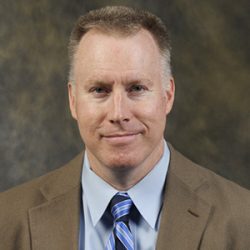
 Coming Soon! Digital Badges for GEP Courses
Coming Soon! Digital Badges for GEP Courses BY WAYNE BOWEN, PH.D., INTERIM ASSOCIATE DEAN, COLLEGE OF UNDERGRADUATE STUDIES
UCF will award a digital badge in Written Communication to students who complete ENC 1101 with a grade of “C” or better. It is the first of several badges that Florida state universities and colleges will introduce over the next few years. We’ll update you when Florida introduces new badges.
Florida House Bill 1507, passed in 2021, requires public postsecondary institutions to award students a nationally recognized digital badge upon completion of general education core courses that demonstrate career readiness. The mandate begins in 2022-23 with students who initially enter Florida state universities and colleges in fall 2022.
The Florida Board of Governors and the Florida Department of Education formed faculty committees to review and recommend criteria for earning badges. Students can post their digital badges on resumes, LinkedIn profiles, and electronic transcripts. These credentials will indicate to employers that students can demonstrate these competencies.
UCF’s Registrar’s Office will be responsible for awarding the badges. Faculty members will continue to submit grades as usual.
Information about the General Education Digital Badge Requirement is available on the Florida Department of Education website.
 Preparing for Fall 2022
Preparing for Fall 2022
 Preparing for Fall 2022
Preparing for Fall 2022BY AMY DARTY, M.A., GEP FACULTY FELLOW
As you prepare for Fall 2022 courses, faculty should include GEP branding images, icons and descriptions of the Outcome(s) which align with their course. All colleges and departments have primary and secondary outcomes for their GEP courses – review the materials provided by Undergraduate Studies and contact your GEP Coordinator for assistance with department-specific requirements.
Actively linking resources and providing common imagery enables students to reflect on and incorporate an integrative mindset into their learning. Cross-marketing with the GEP branding also promotes your teaching as foundational within the GEP for the development of a well-rounded academic experience. Feedback from students who have seen these visuals within courses during the pilot phase noted the imagery and contextual explanations of the outcomes helped them connect ideas/content across courses, see the purpose of the outcomes in a practical way, and assisted with course planning.
To assist you in the process of GEP branding your materials, use the checklist and content imagery provided on the GEP Faculty Learning Community webcourse. Please include imagery/icons on syllabi and assignments as well as handouts and digital resources to enhance transparency and connections to the GEP directly as we move forward with assessment.
As always, talk to your students about the GEP and why integrative learning makes sense for them. Give them context for the meaning behind the outcomes and ask for them to reflect on it, whether formally in an assignment, in discussions, or private reflective practice.
Students who have tested this approach reported they felt more engaged and understood more of the interconnections of the GEP. In one student’s words, “I finally realize why all these classes had to be done, not just paid for and gotten through.” She also shared how surprised she was that something she was learning in one GEP class actually made more sense once she saw the connection to the other class “in a way nobody ever pointed out to her before.” In essence, grasping the point! ????
If you have questions about the task force, please contact me.
 GEP Assessment Updates!
GEP Assessment Updates!BY ANNABELLE CONROY, PH.D., GEP FACULTY FELLOW
The FCTL Summer Faculty Conference included a GEP track. The participating faculty cohort focused on the Learning Outcomes assessment process and developed a new rubric and assessment library.
New Rubric
We will introduce the new five-point rubric this semester. It will replace the original three-point version. The new evaluation model will better align with the traditional A-F grading system and provides deeper insights into students’ achievements and needs.
|
Exemplary
|
Outstanding
|
Competent
|
Developing
|
No Data/Unsatisfactory
|
|
4
|
3
|
2
|
1
|
0
|
The Foundations’ Learning Outcomes remain the same. We updated the information in Canvas to reflect the new rubric criteria. Canvas’ Outcome Alignment page guides aligning Learning Outcomes in New Quizzes.
Assessment Assignments Library The Summer Conference GEP track cohort also developed a series of assignments for use in GEP courses. We hope faculty members will continue creating various assignments to share with colleagues in their Foundation. This fall, the information will be available on GEP Faculty Learning Community site in Webcourses.
Fall 2022 Assessment Planning Notes Since spring 2022, the Center for Distributed Learning (CDL) has been testing the New Quizzes tool. This semester, we are planning a series of workshops to introduce faculty to the resource and discuss how to link the GEP Foundation Learning Outcomes to assignments.
To continue the internal assessment process and prepare for the external accreditation process, we ask faculty members to create an assignment to assess one of the Learning Outcomes in their primary Foundation by Friday, October 28. This assessment snapshot will provide insight into students’ progress toward achieving the learning outcomes before the end of the term.
During the fall 2022 term, the GEP Assessment Task Force will continue to implement a comprehensive assessment plan. Please email me if you are interested in being part of the task force.
If you have questions about the task force, please contact me.
 Encouraging Students to Think 30
Encouraging Students to Think 30
At UCF, we know that everyone has potential and are committed to ensuring that they receive an exceptional education to position them for future success. Faculty members are essential to enabling our students to thrive at UCF and beyond.
To help them remain on track, UCF offers resources such as the Pegasus Path and myKnight Audit. The UCF Think 30 initiative is another way that we help students stay on track to on-time graduation. It encourages students to take 30 credit hours each academic year and highlights the benefits of earning their bachelor’s degree in four years. Students place tremendous weight on messages shared by their professors. We are asking faculty members to consider including a short statement about Think 30 in their Fall 2022 syllabi or webcourses. A sample message is:
Achieving your academic and professional goals requires planning and earning your bachelor’s degree. To graduate on time, you need to take 30 credit hours each year to complete most majors. Plus, you’ll reduce debt, start your career, and increase your lifetime earning potential. Get tips to Think 30 at academicsuccess.ucf.edu/think-30.
| If you have questions or need additional information about the GEP Refresh, please email Wayne Bowen |
